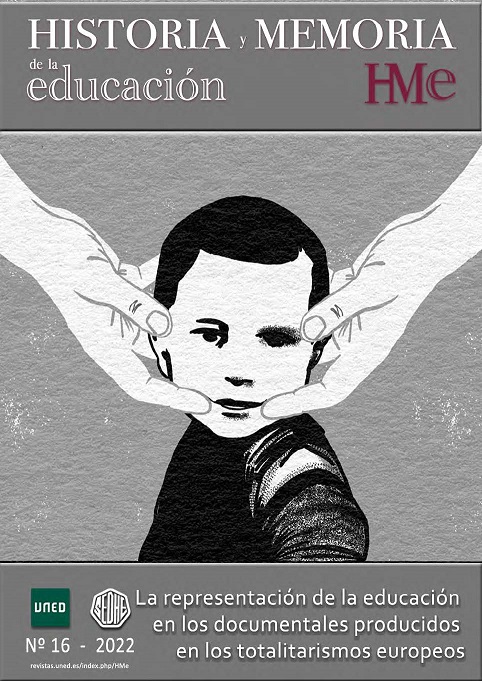Der Marsch zum Führer: documentary films and newsreels in the indoctrination of youth in Nazi Germany
DOI:
https://doi.org/10.5944/hme.16.2022.31842Keywords:
Nazi propaganda, Training, Indoctrination, Hitler Youth, Newsreels, DocumentaryAbstract
Documentaries and educational newsreels have only begun to constitute an area of research in Spain in recent years. From this perspective, our article aims to contribute to the analysis of documentaries as well as the mechanisms used by the Nazi regime for the promotion of certain educational ideals, both formal and non-formal, with the clear objective of indoctrinating the country’s youth. In addition to highlighting the propagandistic instrumentation of cinematography as a fundamental part of education in the interior of the country and beyond its borders, we analyze the role of the Hitlerjugend and Bund Deutscher Mädel in the mechanisms used for indoctrination. To substantiate this discourse, we have carried out a study based on primary sources, both film and text. These include, on the one hand, the documentary Der Marsch zum Führer, as well as the Junges Europa and NO-DO news programs. On the other hand, we examine the network of instruments that controlled the formation of youth and that relied on books and journals with speeches that reflected the visual materials worked on: works such as Marschtritt Deustschland and the Junges Europa journal. The results feature characteristics, in the form of both visual symbols and textual content, that coincide with the typical educational elements of European totalitarianism.
Downloads
References
Adam, Peter. El arte del Tercer Reich. Barcelona: Tusquets, 1992.
Almeida Aguiar, Antonio S. «Adoctrinar con la palabra: prensa y propaganda nacionalsocialista en las islas Canarias durante la Guerra Civil». Historia y comunicación social 25, no.2 (2020): 385. http://dx.doi.org/10.5209/hics.72270
Busto Miramontes, Beatriz. «El poder en el folklore: los cuerpos en NO-DO (1943-1948)». Trans. Revista Transcultural de Música 16 (2012): 1-30. Recuperado de https://www.sibetrans.com/trans/articulo/407/
Chomsky, Noam. La (des) educación. Barcelona: Crítica, 2010.
Collelldemont, Eulàlia y Conrad Vilanou (coords.). Totalitarismos europeos, propaganda y educación. Una historia visual desde los NO-DO. Gijón: Trea, 2020.
Collelldemont, Eulàlia. «Los campamentos juveniles y la naturaleza: un simple decorado» en Totalitarismos europeos, propaganda y educación. Una historia visual desde los NO-DO, coordinado por Eulàlia Collelldemont y Conrad Vilanou, 131-148. Gijón: Trea, 2020.
Collelldemont, Eulàlia (coord.). Registro de los reportajes y noticias en los que aparece representada la educación (1940-1975). Proyecto Análisis de las representaciones audiovisuales de la educación en documentales y noticiarios durante el franquismo (2013-2016). Recuperado de http://repositori.uvic.cat/bitstream/handle/10854/5845/
Cosandey, Roland. «Films nazis, 1933-1945». Cinémathèque suisse. https://www.cinematheque.ch/fileadmin/user_upload/Expo/films_nazis/films_%20nazis_%201.pdf
Davidson, Martin. El nazi perfecto. Barcelona: Anagrama, 2012.
De Ras, Marion E.P. Body, feminity and nationalism: girls in the German youth movement 1900-1934. NY, London: Routledge, 2008.
Dussel, Inés. «La verdad en la imagen propagandística. Reflexiones sobre un corpus enigmático (Westerbork, 1944)». Historia y Memoria de la Educación 8 (2018): 23-58. https://doi.org/10.5944/hme.8.2018
Fass, Paula S. (ed.). The Routledge History of Childhood in the Western World. London, NY: Taylor & Francis Group, 2012.
Grunberger, Richard. Historia Social del Tercer Reich. Barcelona: Ariel, 2007.
Gubern, Román. La imagen pornográfica y otras perversiones ópticas. Madrid: Akal, 1984.
Kaes, Anton. Shell Shock Cinema: Weimar Culture and the Wounds of War. Princenton: Princenton University Press, 2009.
Kracauer, Siegfried. De Caligari a Hitler. Una historia psicológica del cine alemán. Barcelona: Paidós, 1995.
Lepage, Jean-Denis G.G. Hitler Youth, 1922-1945: an illustrated History. London: McFarland & Company, Inc., Publishers, 2008.
Martín de la Guardia, Ricardo. «Propaganda y control social en la Alemania nacional socialista». Historia Social 34 (1999): 101-116. Recuperado de: https://dialnet.unirioja.es/servlet/articulo?codigo=121336
Mir Curcó, Conxita. Jóvenes y dictaduras de entreguerras. Propaganda, doctrina y encuadramiento: Italia, Alemania, Japón, Portugal y España. Lleida: Milenio, 2007.
Molina Poveda, María Dolores. «El NO-DO como medio de construcción de la identidad femenina (1943-1975)». Historia y Memoria de la Educación 12 (2020): 239-270. https://doi.org/10.5944/hme.12.2020
Moreno Cantano, Antonio y Misael López Zapico, «Propaganda del odio: las exposiciones anticomunistas en el Tercer Reich». Historia y Comunicación Social 19 (2014): 171-192. https://doi.org/10.5209/rev_HICS.2014.v19.47291
Mosse, George L. La nacionalización de las masas. Madrid: Marcial Pons, 2005.
Nicolás Meseguer, Manuel. La intervención velada. El apoyo cinematográfico alemán al bando franquista (1936-1939). Murcia: Universidad de Murcia, 2004.
Paz Rebollo, María Antonia y Carlota Coronado Ruiz. «Mujer y formación profesional durante el franquismo. NO-DO, 1943-1975», Pandora: revue d'etudes hispaniques 5 (2005): 133-145. Recuperado de https://dialnet.unirioja.es/servlet/articulo?codigo=2564574
Pine, Lisa. Education in Nazi Germany. Oxford: Berg, 2010.
Pinzón Olarte, Ivonne. «La construcción cinematográfica del enemigo en la Alemania nazi». Revista de Psicología Universidad de Antioquia 9, no. 2 (2017): 139-156. https://doi.org/10.17533/udea.rp.v9n2a09
Sander, Anneliese Ursula. Jugend un Film. Berlín: Zentralverlag der NSDAP, 1944.
Sandoval, Teresa. Historia del cine documental alemán (1896-1945). Madrid: T&B Editores, 2005.
Schumann, Dirk, «Childhood and youth in Nazi Germany» en The Routledge History of Childhood in the Western World, editado por Paula S. Fass, 451-468. London, NY: Taylor & Francis Group, 2012.
Stargardt, Nicholas. Witnesses of war: children's lives under the Nazis. London: Jonathan Cape, 2005.
Tornafoch Yuste, Xavier. «Las instituciones sociales modélicas», en Totalitarismos europeos, propaganda y educación. Una historia visual desde los NO-DO, coordinado por Eulàlia Collelldemont y Conrad Vilanou, 149-164. Gijón: Trea, 2020.
Welch, David (ed.). Propaganda and the German Cinema 1933-1945. New York: B Tauris, 2001.
Welch, David. Nazi propaganda. The power and limitations. New Yersey: Barnes & Noble Books, 2016.
Zeman, Zbynek A.B. Nazi Propaganda. Oxford: Oxford University Press, 1964.
Zimmermnann, Peter y Kay Hoffmann (eds.), Geschichet des dokumentarischen films in Deutschland. Band 3: Drittes Reich 1933-1945 (Stuttgart: Reclam, 2005). https://doi.org/10.25969/mediarep/14037
Downloads
Published
How to Cite
Issue
Section
License
Copyright (c) 2022 Historia y Memoria de la Educación

This work is licensed under a Creative Commons Attribution-NonCommercial 4.0 International License.
Authors who publish in Historia y Memoria de la Educación agree to the following terms:
- Authors retain copyright and grant the journal right of first publication with the work simultaneously licensed under a Creative Commons Attribution-NonCommercial 4.0 International that allows others to share the work with an acknowledgement of the work's authorship and initial publication in this journal.
- Authors are able to enter into separate, additional contractual arrangements for the non-exclusive distribution of the journal's published version of the work (e.g., post it to an institutional repository or publish it in a book), with an acknowledgement of its initial publication in this journal.
- Authors are permitted and encouraged to post their work online (e.g., in institutional repositories or on their website) prior to and during the submission process, as it can lead to productive exchanges, as well as earlier and greater citation of published work (See The Effect of Open Access).










